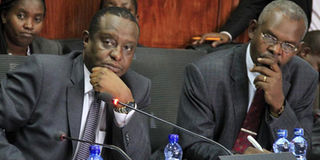Sh14.4bn for marginalised counties unused, says PS

National Treasury Cabinet Secretary Henry Rotich (left) and PS Kamau Thugge listen to responses during a Liason Committee hearing at Parliament Buildings on April 13, 2016. The ministry has allocated more money to the Equalisation Fund. PHOTO | DIANA NGILA | NATION MEDIA GROUP
What you need to know:
- The fund was allocated Sh6 billion in the 2015/16 financial year and then Sh6.4 billion in the current financial year.
- Through the Fund, the national government is required to improve the provision of basic services such as water, roads, health facilities and electricity to marginalised areas.
Demands by MPs from marginalised areas have pushed up the allocation to the Equalisation Fund by Sh2 billion this financial year, making unused funds to shoot up to Sh14.4 billion.
Treasury Principal Secretary Kamau Thugge last week told a parliamentary committee that the fund was yet to be used for various reasons, among them a delay by the Commission on Revenue Allocation (CRA) to come up with a policy.
“We had specific projects based on the criteria identified by the CRA. We sent those projects to Parliament and they had their own public participation and by the time they came back, they had additional projects over and above the Sh12.4 billion,” said Dr Thugge.
“We now have the projects. The ministries had public participation and we are now beginning to implement those projects. If they don’t, that money remains in the Equalisation Fund to be used on those projects,” he added.
Members of the Finance, Trade and Planning Committee had asked Dr Thugge and other Treasury officials why the Equalisation Fund had been allocated more money in the supplementary budget despite there being unused cash.
The fund was allocated Sh6 billion in the 2015/16 financial year and then Sh6.4 billion in the current financial year.
In the next financial year – 2017/18 - the fund has been allocated Sh7.7 billion.
When the Treasury presented to the Budget and Appropriations Committee the list of projects identified for the 14 marginalised counties, MPs in that team rejected it and pushed to have the priority areas identified through a better process.
Through it, the national government is required to improve the provision of basic services such as water, roads, health facilities and electricity to marginalised areas.





